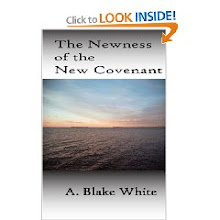
I just finished the prologue and introduction to John MacArthur's new book entitled The Jesus You Can't Ignore: What You Must Learn From the Bold Confrontations of Christ. I cannot recommend this book enough and I have not even gotten to the meat of MacArthur's content. I have read bits and pieces throughout the book, but I am also going to read it straight through. It will serve, I think, as a wonderful supplement to the small group studies in the Gospel of John. What MacArthur has done is synthesized two of the Synoptic accounts and the Gospel of John (thus Matthew, Luke, and John) into one chronological analysis of Christ's interaction with the religious leaders of His day. This is a highly needful book today. Jesus is simply not the reserved, congenial, pacifistic, theologically ultraminimalistic teacher that many portray Him as (the picture for this post represents this "false Jesus"). Was He gentle, kind, and loving? Absolutely! But He was also boldly confrontational when it came to saving truth- Gospel truth!
Allow me to give you a couple of excerpts. The first one is from the prologue; the second from the introduction of the book. Hopefully, these excerpts will serve as an impetus for you to purchase this book:
"Jesus' interaction with the religious experts of His time was rarely even cordial. From the time Luke first introduces us to the Pharisess in Luke 5:17 until his final mention of the 'chief priests and rulers' in Luke 24:20, every time the religious elite of Israel appear as a group in Luke's narrative, there is conflict. Often Jesus Himself deliberately provokes hostilities. When He speaks to the religious leaders or about them-whether in public or in private- it is usually to condemn them as fools and hypocrites (Luke 11:40; 12:1; 13:15; 18:10-14). When He knows they are watching to accuse Him of breaking their artificial Sabbath restrictions or their manmade systems of ceremonial washing, He deliberately defies their rules (Luke 6:7-11; 11:37-44; 14:1-6). On one occasion, when He was expressly informed that His denunciations of the Pharisees were insulting to the lawyers (the leading Old Testament scholars and chief academicians of that time), Jesus immediately turned to the lawyers and fired off a salvo at them, too (Luke 11:45-54)."
"There's nothing wrong with asking, 'What would Jesus do?' That's a fine question. How would Christ Himself respond to the post-evangelical goulash of opinions represented in Christianity Today, in the emerging blogosphere, and in the trendy evangelical magachurches that have held the evangelical movement in thrall for the past few decades? Would He affirm the current mainstream evangelical apathy toward truth and authentic Biblical unity? Would He approve of those who, confronted with the plethora of contradictions and doctrinal novelties, simply celebrate their movements's 'diversity' while trying to avoid all controversy, embracing every theological renegade, and elevating orthopraxy over orthodoxy? Was Jesus' meek-and-gentle mildness of that sort?
I'm convinced we can answer those questions with confidence if we first ask a slightly different question: What did Jesus do? How did He deal with the false teachers, religious hypocrites, and theological miscreants of His time? Did he favor the approach of friendly dialogue and collegial disagreement, or did He in fact adopt a militant stance against every form of religion?
Anyone even superficially familiar with the gospel accounts ought to know the answer to that question, because there is no shortage of data on the matter...Jesus' interaction with the Scribes, Pharisees, and hypocrites of His culture was full of conflict from the start of His earthly ministry to the end. Sometimes the Pharisees provoked the conflict; more often than not, Jesus did. Hostile is not too strong a word to describe His attitude toward the religious system they represented, and that was evident in all His dealings with them.
We're going to survey that theme in this book. We'll see that Jesus never suffered professional hypocrites or false teachers gladly. He never shied away from conflict. He never softened the message to please genteel tastes or priggish scruples. He never suppressed any truth in order to accommodate someone's artificial notion of dignity. He never bowed to the intimidation of scholars or paid homage to their institutions. And He never, never, never treated the vital distinction between truth and error as a merely academic question."
(I can't help but view MacArthur's book as a great response to those today who want to distort the transcendance of God to mean that we cannot know anything for sure about God. In a culture that despises certitude and promotes academic speculation, MacArthur's voice is well needed. He opposes all forms of postmodern epistemologies to which we have been speaking about in Sunday school.)








No comments:
Post a Comment